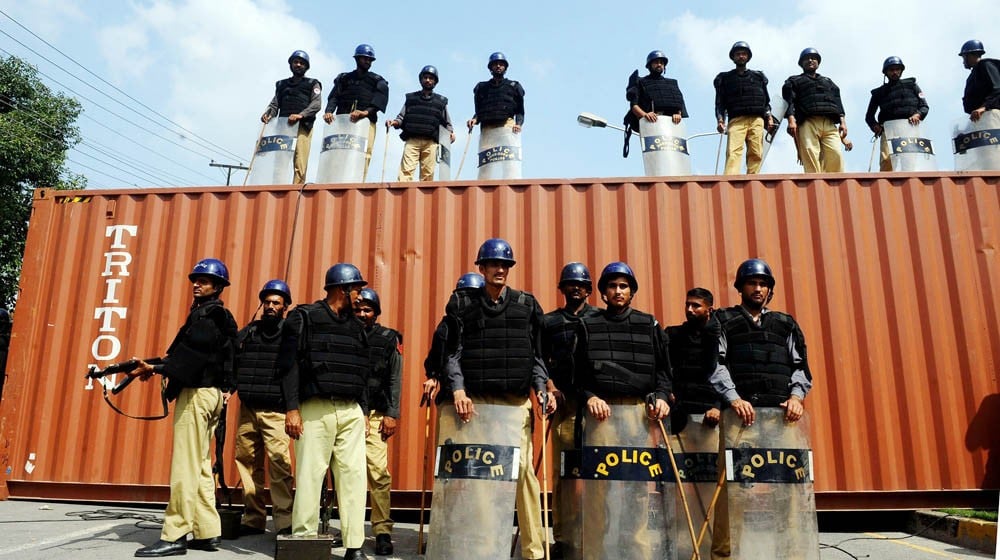
The key to foiling terrorism is to maximise invisible intelligence and reduce the extensive visibility of law enforcement agencies

After the launch of National Action Plan, the state has, to a greater extent, reclaimed its ground earlier lost to terrorists and miscreants. Nevertheless, the rare happenings of terror episodes point out to the fact that we still need more to do to decisively defeat militants. From Bacha Khan University terror episode to suicide blasts in Quetta and Lahore to Mardan this year, a common thread running through all these gory happenings is that Taliban still have the capability to strike against the state and its people. The question is how to eliminate Taliban’s capacity to strike?
During my recent journey from Quetta city to Kalam via Zhob-DI Khan-Mianwali to Islamabad to Mardan to Swat, I, in my some 1400-km journey, passed through numerous check posts manned by the FC and Levies in Balochistan, Levies and police in Khyber Pakhtunkhwa and police in Islamabad. Every time you cross a check post, no matter it is manned by any of the above law-enforcement agencies, three questions are asked: "Introduce yourself"; "where are you coming from?"; and "where are you going to?"
Additionally, almost invariably you are asked to show your vehicle’s registration book. Depending upon your answers to these questions, you are either asked to proceed with the journey or simply told to park the car for further search. Much depends upon the mood of the men deployed there. Sometimes, one is asked unnecessarily to "show the original file of your car and original number plates".
In addition, officials from Pakistan Customs and Excise and Taxation Department and anti-car lifting cell also stop you on various places and inquire about vehicle’s registration only and ask no irrelevant questions. Having access to verification system of Excise Department, they either verify automobile’s registration or simply confiscate vehicle if registration is found fake.
There are serious defects with these so-called security measures aimed at thwarting terrorist attacks, however. Firstly, stopping motorists on these numerous check posts for the same questions is the multiplication of responsibilities on the one hand and causes unnecessary delays in journey on the other. The question is, if despite all these numerous checking a terror plot is executed, which LEA will be held responsible for the failure of security? Secondly, the question is, have all these measures been successful in arresting the terrorist or preventing a terror plot?
A senior security official who has served in Quetta says that check posts have hardly in a case or two helped thwart a terror incident. In the case of Balochistan, he believed that if taken on the merit of their utility, check posts would be halved in number. Third, entrusting the FC, levies and police with the authority to exercise the powers of customs and excise and taxation is a case of interfering in each other’s domain, an omen for clash of institutions.
In fact, our modus operandi is archaic and outdated. The desperate need is to readjust security measures to meet the requirements of time. The first step is to make sense of the nature of threat we are facing. Taliban live among the people they kill. In my recent visit to industrial estate Hayatabad Peshawar, I found that the major concern of traders was their target killing. Traders recall how their colleagues get killed when they fail to deliver extortion money demanded in the name of Taliban. Not much different is the story of Swat -- the major concern is the target killing of pro-state activists by the Taliban. Resultantly, there is an overwhelming sense of fear.
Taliban are an invisible enemy. Fighting them through visible means -- the police, FC and levies -- is almost useless. Terrorists are rational beings and smarter than we may believe. They know where the state is vulnerable and thus strike.
Fighting invisible enemy necessitates a switchover from visible means to invisible means. Increasing the number of intelligence operatives and intensifying intelligence are the way forward. This should be followed by intelligence-based operations. I remember when a security official at Jamrud told me in the wake of terrorist attack on BKU Charsadda that it were through intelligence-based operations that on average they were able to foil terror plots in nine out of ten cases.
Secondly, strengthening border management on Pak-Afghan border will help reduce the chances of executing terrorism from either side of the border. The aim should be to regulate not discourage interstate movement. In my interviews with Afghan refugees in Islamabad, they told that each time they cross into Pakistan, security officials at the border charge them 100 rupees in lieu of checking their bags.
Thirdly, the authority of checking vehicle registration should be assigned to Customs and Excise and Taxation Department only because only they have access to verification system. The FC and levies in Balochistan and levies and police in Khyber Pakhtunkhwa have no access to verification system and hence they only bother the motorists when they ask them to prove that the vehicles are theirs. In case the levies and police and the FC are given the authority to check the originality of a vehicle then they should have access to the verification system too. Facilitating the public not victimising them should be the priority.
During my visit to Zahidan, Iran, a few months ago, when I pointed out to the sheer sense of security despite the stark absence of any police on roads, an official informed me that administration relied more on the invisible intelligence than the visible police. What is equally important to know is that Iran has strengthened its security of Pakistan-Iran border at Taftan too. Twenty four hours a day, Iranian security men guard the border.
Also in our case, the key to foiling terrorism is to maximise intelligence and reduce the visibility of LEAs and regulate movement on Pak-Afghan border.